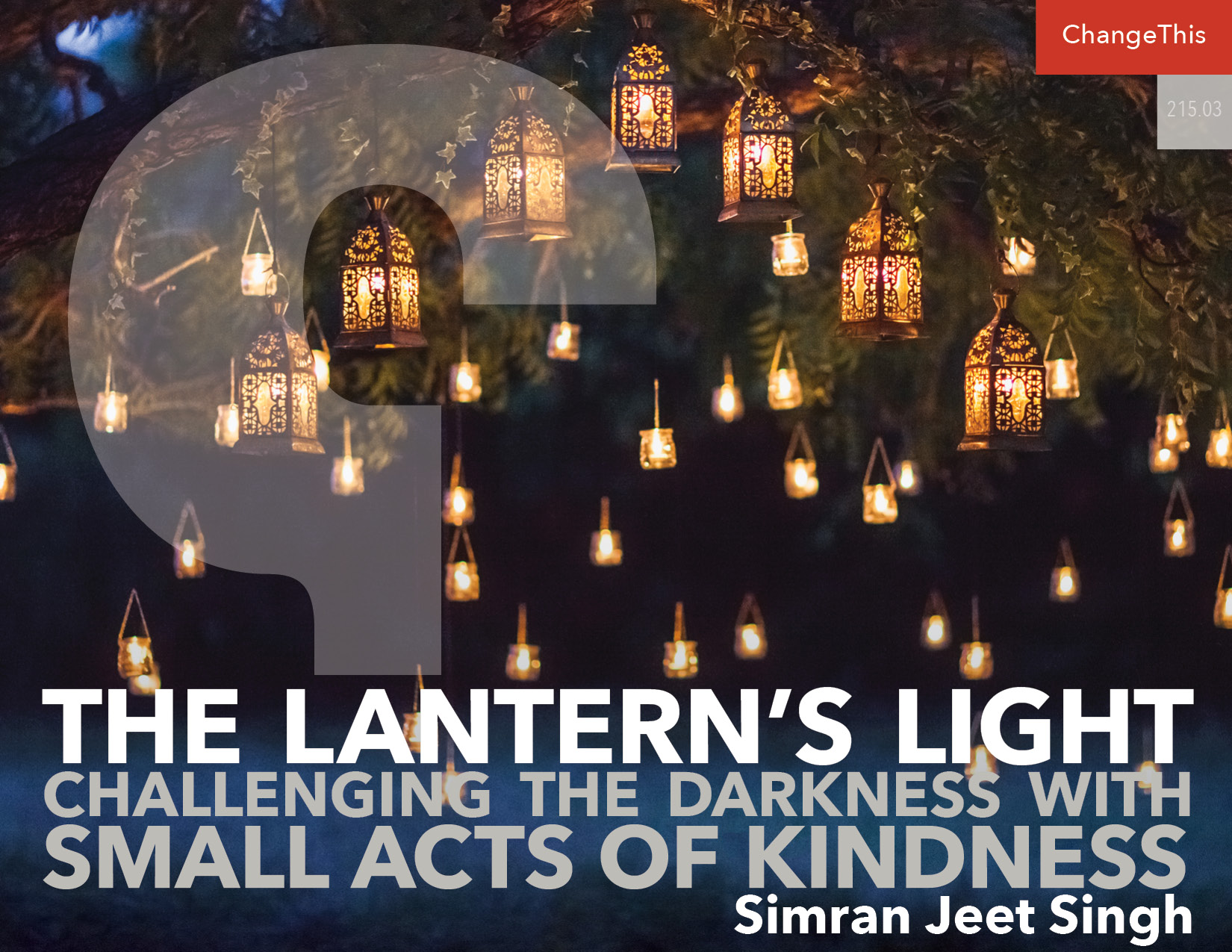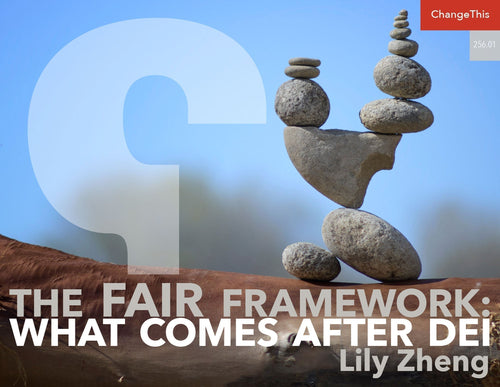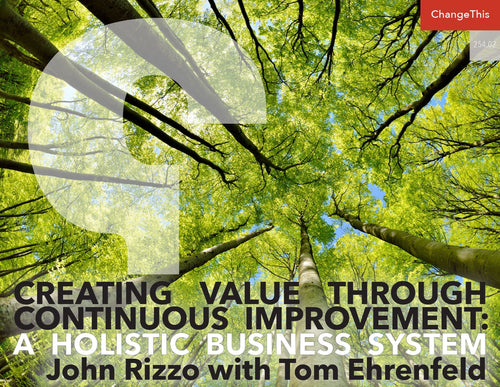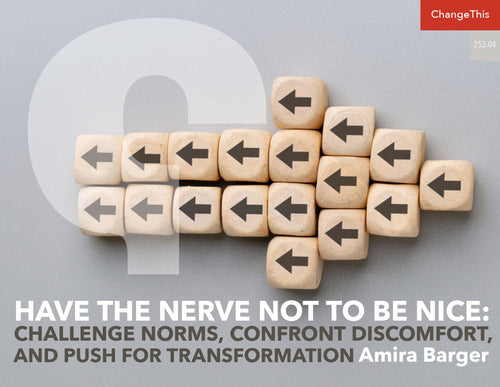The Lantern’s Light: Challenging the Darkness with Small Acts of Kindness
I was a teenager when I learned how much people spent on haircuts—and I was floored.
I thought that maybe the Sikh gurus were on to something with the whole no cutting hair thing. Think of the money my family saved. I mentioned it, half-jokingly, to my soccer teammate Anton, who replied, “Yeah, but think about how much you spend on shampoo and conditioner.”
We all see the world from our own eyes.
Ever since I was a boy, I’ve tried to understand how my life experiences might differ from those of my friends and neighbors. As I grew older, I sought to make meaning of another kind of difference. I viewed myself a certain way, but people perceived me differently. How would I reconcile these two understandings? We all go through this process on our own journeys. Perhaps this is what it means to mature.
By virtue of who I am, a Sikh man in modern America who was born and raised in Texas, I experienced the aftermath of 9/11 as a pivotal moment in my life. Your experience may be similar to mine; you might have been more directly affected by it than I was; you might have seen it from a distance or from the corners of your eyes, or even from memories passed down to you.
We have shared experiences, yet we experience them differently.
I have grown immensely by opening myself up to the world. Rather than being judgmental about different perspectives and ways of living, I am now intrigued and curious. Why do you think so? What experiences inform that outlook? Taking this approach reveals that there’s more to us than the attributes we are born with or our experiences at the surface. We all have it in us to journey together to our shared interior, to the inner struggles that make us human and that we hold in common. Traveling together can help us make meaning—of ourselves and our world—and can help us find answers to questions we never even thought to ask.
Besides, I prefer to travel with support and company. Life is so much more enjoyable when we feel connected and move with purpose.
If we can learn to see the humanity in ourselves and in one another, we can mitigate so much of the self-inflicted pain we feel daily. It’s a simple upgrade, really, and it’s intuitive, too. Even my two toddlers understand: Being kind to others makes them happy and makes you happier, too.
(This is what I tell them every morning as I try to convince them to let me sleep in).
This way of life is not a cure-all or a ready-made solution for all our problems. There will always be things beyond our control. But calming our inner tumult is within our control. To paraphrase Guru Nanak, “If we can conquer our minds, we can conquer the world.”
All this might make sense in theory, but finding inner peace is hard work. It takes time and commitment and effort, and don’t we all have enough to do already? I’d also love to be more generous and caring and compassionate, but the truth is that dealing with people can be annoying, even the ones we love.
And as we look around at our world on fire, there are plenty of reasons for us to be frustrated, outraged, and angry. The negativity that surrounds us can be overpowering, turning simple acts like turning on the news or checking our social media into fraught, anxiety-provoking experiences. In the words of civil rights leader Fannie Lou Hamer, we’re sick and tired of being sick and tired.
So how do we go on? Here’s some real-life inspiration. Jaswant Singh Khalra wasn’t always a human rights hero.
In the 1980s, Khalra was a director in a cooperative farmers bank in Amritsar, Punjab, when two of his colleagues suddenly went missing. Khalra began looking for them, and his search led to a horrifying discovery: evidence that the Punjab Police had illegally killed and cremated thousands of Sikhs. Worse still, Khalra would soon realize that the files he’d first unearthed represented just a fraction of the large-scale persecution targeting the Sikh community. Despite threats to his life from government and police authorities, Khalra continued to investigate for years, uncovering and identifying nearly 25,000 extra-judicial killings and illegal cremations of Sikhs in the state of Punjab.
In 1995, Khalra disappeared like the thousands before him, never to be seen again. Witnesses implicated the police in his murder, and it took ten years for them to be held accountable. On November 18, 2005, six Punjab police officials were convicted for Khalra’s abduction and murder.
Just before his disappearance, Khalra visited Canada. He planned to tell the world about the severity of human rights atrocities in India. Some of his supporters, worried about the increasing threats to his life, urged Khalra to stay in Canada as a political asylee. With characteristic grace and gentleness, Khalra responded that a truly wise person knows that truth and justice are greater than fear. From the stage of a gurdwara in Ontario, in his last speech before his own abduction, Khalra shared a Punjabi folktale about a lantern that insisted on challenging the darkness, no matter the consequences:
“There is an old tale about when the sun was first setting. As her distance narrowed to the horizon, the light on earth slowly diminished. This made way for darkness to creep over the land. The people were afraid that when the sun would finally set, darkness would be permanent. ‘What will happen to us?’ they said.
“Far, far, across the land, in a small hut, a little lantern lifted its wick; it said ‘I challenge the darkness. In my small corner I will not let the darkness settle itself around me.’ With this example many other little lanterns in other small huts lifted their wicks to the darkness. And the people watched in amazement as so many little lanterns illuminated the earth, preventing the mask of darkness from taking over.”
The lantern in Khalra’s parable did not seek to end darkness entirely. It was humble enough to recognize that this was not a reasonable objective, and instead, it focused on its own small corner. By doing its part, the lantern’s flicker of light inspired those around it to do the same. It modeled a way forward that could be emulated, collectivized, and scaled. As other lanterns followed, it became apparent that the little lantern’s humble action effected meaningful change.
Although the lantern achieved an ideal outcome in this case, let’s also note that it would have been just as happy if other lanterns did not join its cause. Why is that? Happiness is a function of our individual expectations. The lantern did not set out to save the world. Its satisfaction came in understanding the needs of those it could reach and in seeking to meet those needs. This is what it means to serve selflessly.
This insight resonates at a time when it feels like the world is falling apart all around us. We see suffering and injustice everywhere we look: climate change, lack of healthcare access, gender inequities, racial injustice, widespread corruption, mass incarceration, voter suppression. The list is endless. Our soulful compassion (hamdard) makes us want to act, but being inundated with endless concerns leaves us feeling paralyzed. Add to this that our culture of performing outrage demands an impossible standard, making us feel like imposters if we don’t try to fix every problem, or at least pretend to.
Khalra’s life and his parable offer us a different way of engaging, what we call “seva” in the Sikh tradition. Seva demands humility, disabusing us of our desire to bear the weight of the entire world on our shoulders. Yes, there is endless suffering and injustice in our world, and yes, there are infinite issues to address. But aiming to fix all the problems around us or expecting ourselves and others to always do the right thing is not realistic. If that’s the goal we set for ourselves, then we are setting ourselves up for perpetual disappointment and frustration.
Sikh philosophy presents a different way of understanding and engaging with our world. Rather than seeing the individual self as the starting point (as in Descartes’ “I think therefore I am”), the Sikh outlook is that the entire world is fundamentally interconnected. Seva, therefore, is a way of caring for others, and it’s also a way of caring for ourselves. With each selfless act, we become slightly less selfish; with each loving action, we become slightly more loving. On their own, single acts of seva might seem random, but taken together, they bring light into our world and into each of us.
Sikh teachings offer us a way of life that enables a happier, more fulfilling engagement with the world, one that has shaped a vibrant community and tradition that remains unknown to so many. I’ve experienced firsthand how Sikh spirituality helped me survive the many challenges of life in America—especially racism—while preserving a sense of happiness, compassion, and justice for all. In showcasing the spiritual tenets of Sikhi that I have been studying, practicing, and teaching for much of my life, I also hope to share how anyone can adopt and cultivate these perspectives to enhance their lives.
At its core, Sikh philosophy is about that outlook we try and instill in our own kids: Being kind to others makes them happy and makes you happier, too. We have seen the best among us embody this wisdom, including Khalra, Mandela, and Malala. Yet we don’t even have to rise to their level to be effective in changing the world and enhancing our own lives. We can do our part by living like that lantern, insisting on doing what we can to challenge the darkness. And who knows? Perhaps others will see our flames flickering in the darkness, and maybe they’ll feel inspired to light their flames, too.
Khalra’s life might be an extraordinary case, but his parable offers us light for our everyday lives. Over the past few years, I’ve developed a practice for when I feel ready to throw up my arms in exasperation and give up on people. I shut off my devices, step onto the sidewalks of New York City, and notice the small acts of kindness. A man in a suit notices a baby lost their shoe and chases the woman pushing the stroller to return it. The handle breaks from a teenager’s shopping bag, and the fruit vendor offers his own bags to help her. A construction worker realizes she is one dollar short at the bagel and coffee cart, and the seller replies: “Don’t worry about it. Get me back another time.”
Like many people, I used to describe these as random acts of kindness. But once you start noticing, you’ll see that there’s nothing random about them. They’re happening all around us, all the time. While our world is filled with pain and suffering, and while our culture focuses on the negative, there’s beauty all around us, too. Noticing it can restore our faith in one another and in life itself.
When I watch people help one another, a number of questions come to mind. I wonder what they get out of giving to others. I wonder what moves them to give up something of their own for someone else’s benefit. I wonder who they are and who they care for at home.
More than anything, I wonder how much better our world would be—more generous, more compassionate, and more just—if we could infuse these small acts of kindness into our way of living. In each of these moments, we get a glimpse of the light we have within us, the light we share with one another.
From The Light We Give: How Sikh Wisdom Can Transform Your Life by Simran Jeet Singh published on July 19, 2022 by Riverhead, an imprint of Penguin Publishing Group, a division of Penguin Random House LLC. Copyright © 2022 Simran Jeet Singh.
ABOUT THE AUTHOR
Simran Jeet Singh, Ph.D., is the Executive Director of the Inclusive America Project at the Aspen Institute. He is an Equality Fellow with the Open Society Foundations, Senior Adviser on Equity and Inclusion for YSC Consulting, and a Visiting Professor at Union Seminary. He is a regular contributor to The Washington Post, CNN, and TIME Magazine and writes a monthly column for Religion News Service. The author of the bestselling children’s book Fauja Singh Keeps Going, he lives with his family in New York City.











































